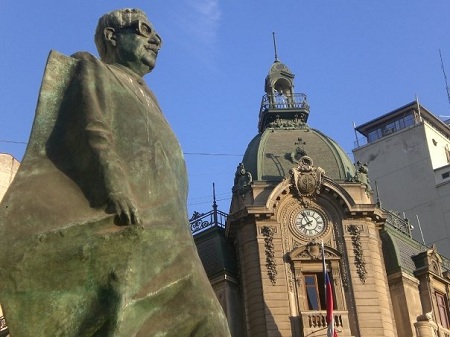While most people in the United States today reflect upon the 11th anniversary of the al Qaeda attacks on New York and Washington, DC, it is easy to forget that “September 11” marks an entirely different national tragedy for Chile.![]()
On September 11, 1973, Chile’s military launched a coup against the country’s elected president, Salvador Allende.
On that day, the Chilean military took the port of Valparaíso at 7 a.m., closed the country’s radio and television stations by 8 a.m., and by 9 a.m., had moved in to occupy Santiago, the capital.
Coup leaders demanded shortly thereafter that Allende resign the presidency. Allende, who remained in the president palace, La Moneda, refused, despite threats to bomb the palace, if necessary, to bring about his resignation. Allende thereupon launched a dramatic speech live on Chilean radio, defending his economic policies and, above all, vowing not to resign in the face of a coup that aimed to overturn the results of a democratic election.
As troops moved in on the palace, Allende either shot himself or was assassinated by the military — the circumstances of his death remain unclear today, but by 2:30 p.m., the military had taken La Moneda.
The coup led to the dictatorship of Augusto Pinochet — and with it, the deaths of up to 3,000 Chileans and the imprisonment and torture of many more thousands of political prisoners during his regime. Although Pinochet’s reforms are credited with restoring economic stability to Chile, and he ultimately conceded to demands for democratic reform (he stepped down in 1990 after losing a referendum for reelection), he was plagued with legal charges in Chile and abroad for human rights violations and embezzlement alike.
Today, 39 years later, Chile still grapples with the national trauma of the 1973 coup and the resulting Pinochet era. The country has one of the most developed economies in South America (notching 6% GDP growth in 2011), and it became the first South American country to become a member of the Organization for Economic Development, which it joined in 2010. There’s no doubt that today’s dynamic Chilean economy had its genesis in the policies of the Pinochet regime.
But political wounds from the 1973 coup and the Pinochet regime have been more difficult to heal. The 1991 Rettig Report, which tallied the number of deaths, disappearances and human rights abuses perpetrated during the Pinochet era, became a textbook example of truth-and-reconciliation commissions. Despite those efforts, the long legal fight against Pinochet cast a dark shadow over Chilean political life until his death just six years ago — he died awaiting trial in Chile; meanwhile, a statue of Allende (pictured above) now sits in the courtyard in front of La Moneda.
Although Chile returned to democracy with presidential elections in 1990, a coalition of center-left parties, the Concertación won every presidential election until just two years ago, when center-right candidate Sebastián Piñera narrowly won election in January 2010, marking the Chilean right’s first return to power in the post-Pinochet era. Continue reading The other September 11: the Chilean coup against Salvador Allende, 39 years on
